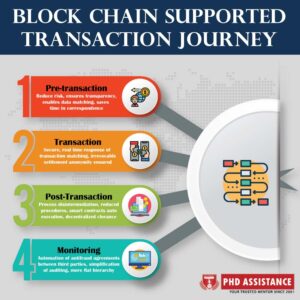Challenges In Block Chain Technology For Future Supply Chain- Future Research Scope For Phd Scholars
Introduction to Block chain technology
Blockchain is the one of the emerging technologies in recent world and a lot of revolution and research has done based distributed technology (1). Blockchain is a Technology that ensures network security, transparency, and visibility through a specific combination of characteristics such as decentralized structure, supplied notes and storage mechanism, consensus algorithm, smart contracting, and asymmetric encryption. In modern days, more and more research studies exploring the usages of blockchain in SC (2)

Blockchain and its implications on supply chain operations
Blockchain is a decentralised digital public ledger that is distributed across the internet. If the documents have been added, they can’t be changed without affecting the previous records, making it extremely secure for business operations. It can be used in a range of fields, such as creating smart contracts to monitor financial fraud or securely sharing medical records between healthcare professionals. Functionality, security, privacy, and cost are still barriers (3). Along with transforming SCs across different industries, it also aids in enhancing the accessibility and security of existing digital networks, such as the Internet of Things (IoTs) and other Industry 4.0 projects (4). Every industry has different requirements for privacy and security protection. Blockchain can be structured in three ways to meet different needs: public, private, and hybrid.

Figure: Block chain supported transaction journey
Challenges
Applications using Blockchain are Increasing at a fast rate, but interoperability is a problem, leading to standardization issues. Block chain integration with SC increases visibility across the entire value chain, reduces paperwork and human errors, ensures transparency amongst all parties, enhances security of data, complements IoTs, helps identify counterfeit products, and enables efficient traceability and management (9).
|
Challenges |
Explanation |
| Organizational requirement and readiness |
|
|
Data collection and management |
|
|
Cost, security, privacy and legal concerns |
|
|
Transition and integration of people, processes and technology |
|
Future research scope
The adoption of blockchain technology needs further Research and exploration in more countries, markets, and companies in order to better understand the most critical factors that contribute to its success. (10). Here mentioned and listed potential study topics in a variety of major SC areas below:
Blockchain adoption and implementation: It is necessary to investigate how the combination of blockchain technology and IoT can affect the SC’s results. Another requirement is to investigate whether a global standard for connecting different blockchain platforms should be built (11).
Supply chain reengineering: One of the most significant advantages of blockchain is that it connects all SC members to a single, stable network. As blockchain is introduced in SCs, however, all relevant data will be exchanged and accessible by all SC partners. (9). Industry experts, researchers and SC managers must explore this issue
Supply chain resilience: Natural disasters, strikes, virus outbreaks (12), and operational threats all cause disruptions and SC vulnerability, and managing the extreme impact and effects of such events on SC networks is often a challenge. 2. Following the COVID-19 pandemic, companies should reconsider and redesign their SC risk management and resilience strategies, putting a greater emphasis on digital networks driven by technologies such as blockchain, IoT, and quantum computing.
Supply chain coordination: Effective blockchain implementation can be extremely beneficial and have many research implications for both Industry and Academia.
The use of blockchain in SC can be investigated for global procurement, collaboration, and strategic alliances in foreign trades. Smart contracts, which are based on supplied ledger technology, can be used to handle ownership transfers, cross-border exchanges, knowledge sharing, and international transactions without the use of intermediaries, among other things (9).
Security enhancement: As blockchain develops and becomes more widely used, ensuring security, especially for cryptocurrency, is critical. To achieve its high efficiency, the blockchain architecture must also be combined with IoTs and cloud computing. As a result, the respective blockchain-based system must be stable in order to ensure a low operational risk (13). Customer authentication, data confidentiality and privacy, and integrity safety must be restored with the highest priority in areas such as healthcare SC, cab services, last mile in e-commerce, and other service sectors. All these issues can be investigated in Future Research.
Conclusion
This article will Assist Researchers and practitioners in better understanding and identifying SC areas and industry sectors where blockchian technology can be applied. Present developments, challenges, and possible research opportunities related to the use of blockchain for supply chain operations are also addressed.
References
- Chatterjee, R., & Chatterjee, R. (2017, October). An overview of the emerging technology: Blockchain. In 2017 3rd International Conference on Computational Intelligence and Networks (CINE)(pp. 126-127). IEEE.
- Dutta, P., Choi, T. M., Somani, S., & Butala, R. (2020). Blockchain technology in supply chain operations: Applications, challenges and research opportunities. Transportation Research Part E: Logistics and Transportation Review, 142, 102067.
- Choi, T. M., Feng, L., & Li, R. (2020). Information disclosure structure in supply chains with rental service platforms in the blockchain technology era. International Journal of Production Economics, 221, 107473.
- Cai Y., Choi T.M., Zhang J. Platform supported supply chain operations in the blockchain era: supply contracting and moral hazards. Decision Sci. 2020 (in press)
- Montecchi M., Plangger K., Etter M. It’s real, trust me! Establishing supply chain provenance using blockchain. Horiz. 2019;62(3):283–293
- Liu L., Li F., Qi E. Research on risk avoidance and coordination of supply chain subject based on blockchain technology. 2019;11(7):2182.
- Chang S.E., Chen Y.-C., Lu M.-F. Supply chain re-engineering using blockchain technology: A case of smart contract based tracking process. Forecast. Soc. Chang. 2019;144:1–11.
- Martinez V., Zhao M., Blujdea C., Han X., Neely A., Albores P. Blockchain-driven customer order management. J. Oper. Prod. Manage. 2019;39(6/7/8):993–1022.
- Pournader M., Shi Y., Seuring S., Koh S.L. Blockchain applications in supply chains, transport and logistics: a systematic review of the literature. J. Prod. Res. 2020:1–19.
- Queiroz M.M., Telles R., Bonilla S.H. Blockchain and supply chain management integration: a systematic review of the literature. Supply Chain Manage.: Int. J. 2019;25(2):241–254.
- Kumar A., Liu R., Shan Z. Is blockchain a silver bullet for supply chain management? Technical challenges and research opportunities. Decision Sci. 2020;51(1):8–37
- Choi T.M. Innovative “Bring-Service-Near-Your-Home” operations under corona-virus (COVID-19/SARS-CoV-2) outbreak: Can logistics become the Messiah? Res. Part E. 2020 doi: 10.1016/j.tre.2020.101961.
- Min H. Blockchain technology for enhancing supply chain resilience. Horiz. 2019;62(1):35–45.
- Betti Q., Khoury R., Hallé S., Montreuil B. Improving hyperconnected logistics with blockchains and smart contracts. IT Prof. 2019;21(4):25–32.
 Previous Post
Previous Post Next Post
Next Post
